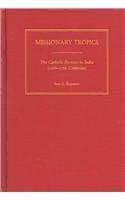
Missionary Tropics: The Catholic Frontier in India (16th-17th Centuries) (History, Languages, and Cultures of the Spanish and Portuguese Worlds) PDF
407 Pages·2005·8.034 MB·
Most books are stored in the elastic cloud where traffic is expensive. For this reason, we have a limit on daily download.
Preview Missionary Tropics: The Catholic Frontier in India (16th-17th Centuries) (History, Languages, and Cultures of the Spanish and Portuguese Worlds)
Description:
By focusing on the Jesuit missionary discovery of Indian "pagan" Hinduism, Zupanov traces the stages of the Jesuit's disconcerting journey into religious relativism or accommodation. At every point of this Euro-Asian encounter, the emerging Catholic communities attempted to twist and turn their own received religion to fit their various collective and/or individual interests. This turning or "troping" of the Jesuit message into pre-Christian modes of religious expression produced the "tropics" of the title.Drawing upon a variety of sources in Portuguese, Italian, Spanish, Latin and Tamil, Missionary Tropics documents the construction of the Indian vernacular Catholicism or "Tropical Catholicism" through a complex layering of missionary religious and social intentions and indigenous responses. By following Galenic humoral medical theory, the Catholic missionaries defined paganism as a natural outgrowth of the hot and humid climate. Reflecting the complex layering of the missionaries' religious and social intentions and the subsequent indigenous responses, this book should be of interest to all those who study religious encounters and are interested in the issues of religious conversion in the early modern world, in India, and elsewhere.Ines Zupanov is Senior Research Fellow, Centre National de la Recherche Scientifique, Paris.
See more
The list of books you might like
Most books are stored in the elastic cloud where traffic is expensive. For this reason, we have a limit on daily download.
